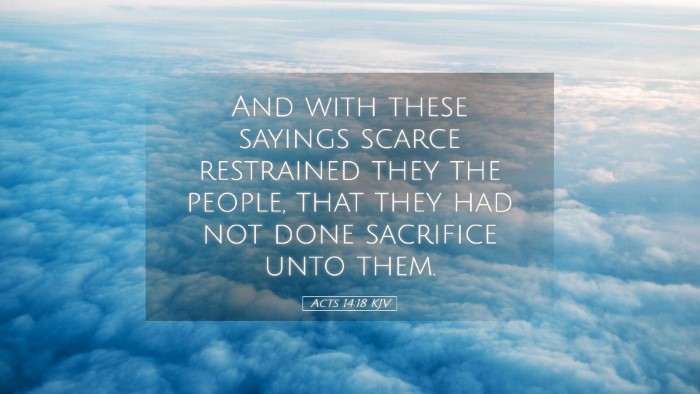Commentary on Acts 14:18
Acts 14:18 states: "And with these sayings scarce restrained they the people, that they had not done sacrifice unto them." This verse encapsulates a profound moment in the journey of the apostles Paul and Barnabas as they navigate the delicate interplay between divine glory and human worship.
Contextual Background
To fully understand this verse, we must consider its context within the broader narrative of Acts. Paul and Barnabas had just healed a man who had been crippled from birth in Lystra (Acts 14:8-10). The miracle led the locals to mistakenly view them as gods - specifically, Hermes and Zeus. In their culture, such acts of healing were often attributed to divine intervention, and the people responded with an eagerness to worship them.
Insights from Public Domain Commentaries
Matthew Henry's Commentary
Matthew Henry emphasizes the passionate nature of the crowd's response, highlighting that they were nearly swept away by their immediate impulses. Henry notes that the apostles were keenly aware of the danger in allowing such veneration, as it detracted from the true worship of God. He writes: "The people had little knowledge, but much zeal. They were ready to worship Paul and Barnabas for the miracle, but the apostles were quick to redirect that worship to the one true God."
Albert Barnes' Notes on the Bible
Albert Barnes views this incident as a critical moment for early Christian apologetics. He argues that Paul and Barnabas understood the implications of being elevated to a divine status by the people. Barnes states: "They knew that to accept such adulation would not only mislead the people but also undermine the very foundation of their message of salvation through Christ." He highlights the significance of the apostles' urgent denial of such honor, which reflects their understanding of their role as servants rather than deities.
Adam Clarke's Commentary
Adam Clarke provides a detailed analysis of human nature as presented in this verse. He asserts that the eagerness to worship reflects a deep-seated desire for connection with the divine, even if misguided. Clarke states: "This incident reveals the extent to which people will go to connect with what they perceive to be divine; however, it also illustrates the need for proper revelation of who God is." Clarke further explains that the swift turn from admiration to potential idolatry demonstrates humanity's penchant for misunderstanding divine acts.
Theological Implications
This verse raises significant theological questions regarding the nature of worship and idolatry. The situation challenges believers to consider how often they may misplace their devotion or misinterpret divine works in their lives.
Human Response to the Divine
Human beings have an intrinsic urge to elevate the extraordinary to the status of the divine. The quickness of the crowd in Lystra to engage in sacrificial worship toward Paul and Barnabas underscores a recurring theme in scripture — the danger of misplaced worship. Here are some points to ponder:
- Misdirected Worship: How often do we direct our worship toward created things rather than the Creator?
- Understanding Divine Acts: What is our response when we witness miracles or acts of God in our lives?
- Idolatry in Modern Context: In what ways does modern society reflect similar tendencies toward idolatry?
The Role of Apostleship
This passage also emphasizes the role of apostleship in the early church. Paul and Barnabas demonstrate a clear understanding of their mission: to proclaim the gospel and direct glory to God alone. Their quick actions to prevent the crowd's adoration highlight essential qualities of effective ministry:
- Humility: Recognizing one's place in God's plan is essential in any ministry or calling.
- Clarity in Purpose: A clear articulation of the gospel prevents misunderstandings about the nature of God.
- Response to Human Nature: Effective ministry must account for the emotional and spiritual tendencies of the audience.
Application for Today's Believers
Acts 14:18 encourages modern-day believers to explore their own understanding of worship and their response to God’s work in their lives. The refusal of Paul and Barnabas to accept worship is a model for how we should respond to accolades and recognition.
Key Takeaways
- Redirecting Glory: Like Paul and Barnabas, we must redirect praise to God rather than basking in the spotlight ourselves.
- Humility in Service: True leaders in the faith must embody humility, acknowledging that all they have is a gift from God.
- Understanding Idolatry: We must stay vigilant against the tendencies of our own hearts to idolize leaders, systems, or rituals instead of the Living God.
Conclusion
Acts 14:18 serves as a powerful reminder of the delicate balance between divine action and human response. It is a call for humility, a challenge to re-evaluate our priorities, and an encouragement to always point others toward Christ. The insights gleaned from this verse serve as foundational truths for pastors, scholars, students, and all believers as they navigate their spiritual journeys in a world filled with distractions and misalignments of worship.


